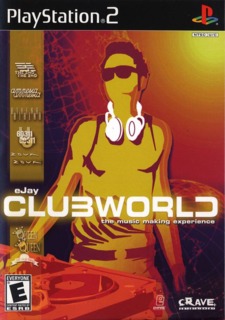DJ your own parties with this great piece of music-making software!
Upon starting it up you are given a pretty pointless introduction by DJ Carl Cox telling you how cool the game is, and, oddly, you never hear from him again, despite the claim on the package of him giving help along the way. Thankfully, there is a helpful tutorial which shows you all the ins and outs of the game. But you will still need to study the instruction booklet very thoroughly, since the tutorial doesn’t quite cover everything. The reason I mention this first is because it should be emphasized that it takes a lot of work to even begin to start turning out anything of quality from eJay. It’s something that you will have to be rather dedicated to in order to achieve results.
Once you are into the game, though, it is a very deep piece of software. There are eight different clubs, or levels, to choose from. Each one represents a different musical style, from Hip-Hop to Electro, House, Ambient, Reggae, etc. Once inside a club, you find yourself in the Arranger which already has the resident mix ready in order to give you some idea of what you can do. You can either modify that mix or do one from scratch. How you make a mix is by taking some of the many sound samples, which the package claims over 10,000 of, and placing them on one of the 20 available horizontal tracks. Each track can be fine-tuned for the sound you want in the Mixer, which is just a button press away. You can adjust each tracks volume, add echo, chorus, reverb; all of which can also have their settings adjusted to your liking; and pan the sound to one side or the other. The master controls can also be fiddled with in order to adjust the entire sound of the mix. It’s basically a fully-functioning mixing board.
Back in the Arranger you can add in pretty much as many samples as you see fit and make the mix as long as you want. The only real limit that is put on you is that each column (the time keeping system) has an amount of memory usage that it is allowed, and there is a gauge on screen that shows how much you are using. If you use up all the memory for any given part of your mix, some of that bit will not be played. But this is pretty hard to do, and I have yet to experience it, myself, having rarely been past halfway up the gauge. All of the samples that you are provided with can also be chopped up into whatever size pieces you need. So if, for example, there is just a single drum beat in a particular sample that you want, it’s incredibly easy to just reduce it down to that single beat. The types of samples you are given are of good variety. Each club has it’s own samples divided into about eight categories, each having at least 150 apiece on the average. With all the editing options that you are given, that leaves a lot of possibilities for what you can make. The main volume and beats per minute can also be adjusted in the Arranger or Mixer.
In two of the clubs there is the Groove Generator, which you can use to make drum loops and such for your mix. You can also record yourself live as you jam along with it. The Groove Generator is a very useful tool. In another two clubs there is the Hyper Generator, which you use to create synthesizer sequences in much the same way as the Groove Generator. In yet another club, the hip-hop one, there is an available turntable which you can use to perform on, and record, during your mix. It’s a shame that these features are not available in all the clubs, though. After you complete your mix you can head over to the Jukebox and make play lists, listen to your music, and even watch your music using some cool visualizations.
When saving, the space provided for your track title and artist name, only twelve characters, seems a bit skimpy, but is excusable. One thing I like best about eJay, though, is the actual amount of space each mix takes up on the memory card. For example, a five-minute mix, going at about 80 bpm, only takes up around 70kb of space! So you can do a lot and not have to worry about running out of room on your card.
So, as you can see, there really isn’t much to eJay, but what is here allows for a great amount of creativity and lasting value. The learning curve is quite high, but it’s worth it when you start to turn out cool music and you are able to say, “I made that.” Heck, get an adaptor for your PS2 stereo cables and hook it up to your computer, you could become a well known online DJ! After all, as the package claims, these are all royalty-free samples. Or you could just keep it down to making your own CDs for friends.
If you’re into this type of thing, or want to give it a try, I recommend you give eJay a shot. At the $10 asking price, there really isn’t much to lose.

